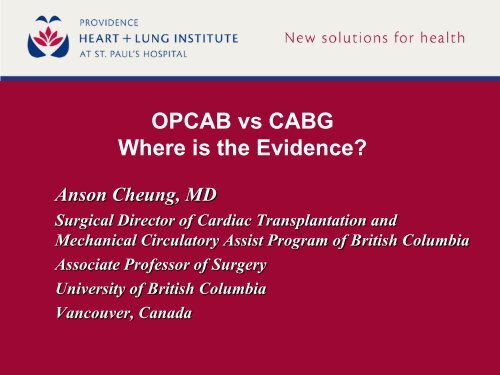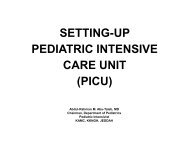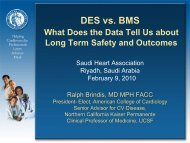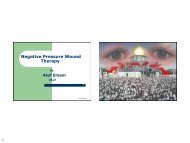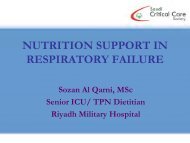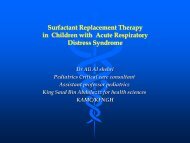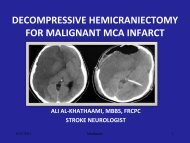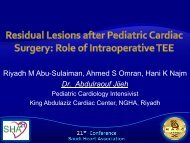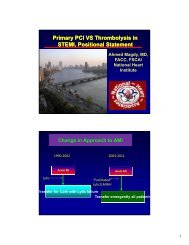Off-pump versus conventional coronary artery ... - RM Solutions
Off-pump versus conventional coronary artery ... - RM Solutions
Off-pump versus conventional coronary artery ... - RM Solutions
- No tags were found...
You also want an ePaper? Increase the reach of your titles
YUMPU automatically turns print PDFs into web optimized ePapers that Google loves.
What percentage of surgical revascularizationsurgeries are off-<strong>pump</strong>?• 1. >75%• 2. 25 – 75%• 3. < 25%
Introduction• Coronary <strong>artery</strong> bypass grafting (CABG) wasthe most frequently performed operation inthe world
Core CABG procedures are declining….
Multi-factorial………• The introduction of DES (drug eluting stents)• More aggressive cardiologists• Bad press
The “Pump Head Paper”• Newman M, Kirchner J, Phillips-Bute B, Gaver V,Grocott H, Jones R, Mark D, Reves J, Blumenthal J(2001). "Longitudinal assessment of neurocognitivefunction after <strong>coronary</strong>-<strong>artery</strong> bypass surgery.". NEngl J Med 344 (6): 395–402
Multi-factorial………• Patient perceptions– PCI (needle poke, risk free)– CABG (Big scar, high risk surgery)• Better preventive care– Risk factors modifications– Lifestyle– Medications (ASA, ACEi, B-blocker, etc)
OPCAB becomes Surgeons’ secret weapon…..• Complete revascularization• Superior revascularization• Without the harmful effects of CPB
OPCAB to become of procedure of choice forrevascularization……• Reduced perioperative and long-term mortality• Completeness of revascularization• At least equivalent graft patency rates
• Reduced perioperative morbidity• A.fib, transfusions, infection, early extubation, hospital stay,etc• Rapid return to usual functional capacity• Economic benefit
Early Mortality• Multi-center (N=126), large cohort of OPCAB (N=11,717), STSriskadjustment• Adjusted OR 0.81 (0.70-0.91)• Biased selection process of patients, mostly single and twovesseldisease OPCAB patients<strong>Off</strong>-<strong>pump</strong> <strong>coronary</strong> <strong>artery</strong> bypass grafting decreases riskadjustedmortality and morbidity. Cleveland JC, Shroyer LW,Chen AY, et al. Ann Thorac Surg 2001;72:1282-1289.
Early Mortality• Retrospective analysis of STS database for the year Jan 99-Dec 00• N=17,969 OPCAB patients, (8.8%) of total• Significant survival advantage with OPCAB by risk adjustedmultivariate logistic regression analysis [OR 0.76 (0.68, 0.84)] andconditional logistic regression of propensity matched groups [OR0.83 (0.73, 0.96)]Magee MJ, Coombs LP, Peterson ED and Mack MJ. Circulation2003;108[suppl II]:II9-14
Early MortalityTwo meta-analyses of mixed-risk groups that includednonrandomized data• 36% reduction in mortality in 46,621 patientsReston JT, Tregear SJ, and Turkelson CM. Ann Thorac Surg2003;76:1510–5. Meta-analysis of short-term and mid-term outcomesfollowing off-<strong>pump</strong> <strong>coronary</strong> <strong>artery</strong> bypass grafting• 21% reduction in mortality in 159,845 patients in 7 studiesBeattie S, Wijeysundera D, Djaiani G, et al: <strong>Off</strong>-<strong>pump</strong> <strong>coronary</strong> <strong>artery</strong> surgeryfor the reduction of perioperative mortality and morbidity: A meta-analysis.Anesth Analg 2004
Early Mortality• Randomized trialsn OPCAB CABG pValuePuskas 3082 (29) 1.2 % 1.0 % 0.9ROOBY 2208 1.6 % 1.2 % 0.47Puskas J, Cheng D, Knight J, et al: <strong>Off</strong>-<strong>pump</strong> <strong>versus</strong> <strong>conventional</strong> <strong>coronary</strong><strong>artery</strong> bypass grafting: A meta-analysis and consensus statement from the2004 ISMICS consensus conference
Mid-term Mortality• Rectrospective, propensity matched datasets (N=906OPCAB), longer follow-up (2-years)• No survival difference• Myocardial revascularization with and without cardiopulmonarybypass: advantages, disadvantages and similarities. CalafioreAM, Di Mauro M, Canosa C et al. Eur J Cardiothorac Surg2003;24 953–60.
Mid-term Mortality• Single center, retrospective, propensity scorematched of 481 OPCAB• No difference in mid-term outcome at 4 years survival87.5% vs 91.2% (p= 0.2)• Freedom from the combined end point of all-causemortality, myocardial infarction, and <strong>coronary</strong>reintervention was 75.2% and 82.9% (P= 0.14)Equivalent midterm outcomes after off-<strong>pump</strong> and on-<strong>pump</strong><strong>coronary</strong> surgery. Sabik JF, Blackstone EH, Lytle BW et al. JThorac Cardiovasc Surg 2004;127:142-8.
Mid-term Mortality• Meta-analysis six randomized, controlled trials of 1135patients.Outcome n (N) OPCAB CABG OR(95% CI)pValueDeath, 1–2years1135 (6) 2.3% 2.6% 0.88(0.41–1.88)Cheng DC, Bainbridge D, Martin JA, Novick RJ: Does off-<strong>pump</strong> <strong>coronary</strong> <strong>artery</strong>bypass reduce mortality, morbidity and resource utilization when compared to<strong>conventional</strong> <strong>coronary</strong> <strong>artery</strong> bypass? A meta-analysis of randomized trials.Anesthesiology 20050.8
Perioperative MorbidityOutcome n (N) OPCAB CABG OR(95% CI)pValueAFPERIOPERATIVE MORBIDITYTransfusion2425 (17) 17.6 26.8 0.58
Early Cognitive Dysfunction• Randomized trial, limited to triple vessel disease patients, ninestandard tests• One week postop– 27% vs 66 (p=0.004) had neurocognitive impairment.• Ten weeks postop– 10% vs 40% (p=0.017)• Assessment of neurocognitive impairment after off-<strong>pump</strong> and on-<strong>pump</strong>techniques for <strong>coronary</strong> <strong>artery</strong> bypass graft surgery: prospectiverandomized controlled trial. Zamvar V, Williams D, Hall J, et al. BMJ2002;325:1268-1273.
Early Cognitive Dysfunction• Randomized trial, 11 standard objective neurocognitive tests,testing at 3 and 12 months• At 3 months post– objective cognitive decline occurred in 21% (CABG) vs 29% (OPCAB)(P=0.15)• At 12 months post– 34% vs 31% after on-<strong>pump</strong> CABG.Cognitive outcome after off-<strong>pump</strong> and on-<strong>pump</strong> <strong>coronary</strong> <strong>artery</strong>bypass graft surgery, a randomized trial. Van Dijk D, JansenEW, Hijman R, et al. JAMA 2002;287:1405-1412.
Renal Failure• One center, cohort of 350 patients, STS risk scoreCABG OPCABLow risk 4% 3% P=0.49Medium risk 10% 10% P=0.79High risk 21% 3% P=0.006Safety and efficacy of off-<strong>pump</strong> <strong>coronary</strong> <strong>artery</strong> bypass grafting.Arom KV, Flavin TF, Emery RW, et al. Ann Thorac Surg2000;69:704-710.
Renal Failure• No differences in randomized trial or in metaanalysis
Completeness of RevascularizationTwo randomized trials have demonstrated a decrease incompleteness of revascularization, whereas five other trials haveshown no difference•Carrier M, Perrault LP, Jeanmart H, et al: Randomized trial comparing off-<strong>pump</strong> to on-<strong>pump</strong><strong>coronary</strong> <strong>artery</strong> bypass grafting in high-risk patients. Heart Surg Forum 2003.•Czerny M, Baumer H, Kilo J, et al: Inflammatory response and myocardial injury following<strong>coronary</strong> <strong>artery</strong> bypass grafting with or without cardiopulmonary bypass. Eur J Cardiothorac Surg2000•Covino E, Santise G, Di Lello F, et al: Surgical myocardial revascularization (CABG) in patientswith pulmonary disease: Beating heart <strong>versus</strong> cardiopulmonary bypass. J Cardiovasc Surg(Torino) 2001Khan NE, De Souza A, Mister R, et al: A randomized comparison of off-<strong>pump</strong> andon-<strong>pump</strong> multivessel <strong>coronary</strong>-<strong>artery</strong> bypass surgery. N Engl J Med 2004•Legare J-F, Buth KJ, King S, et al: Coronary bypass surgery performed off <strong>pump</strong> does not resultin lower in-hospital morbidity than <strong>coronary</strong> <strong>artery</strong> bypass grafting performed on <strong>pump</strong>. Circulation2004•Nathoe HM, van Dijk D, Jansen EWL, et al: A comparison of on-<strong>pump</strong> and off-<strong>pump</strong> <strong>coronary</strong>bypass surgery in low-risk patients. N Engl J Med 2003•Puskas JD, Williams WH, Mahoney EM, et al: <strong>Off</strong>-<strong>pump</strong> vs <strong>conventional</strong> <strong>coronary</strong> <strong>artery</strong> bypassgrafting: Early and 1-year graft patency, cost, and quality-of-life outcomes. A randomized trial.JAMA 2004
Completeness of Revascularization - Patency• Prospective, randomized trial in 176 patients studying outcomesand graft patency patency following total arterialrevascularisation• Superior short term outcomes following OPCAB, with equivalentgraft patency in a randomized selection of patients at 6-12months (OPCAB with 1 – 2 vessel CAD)<strong>Off</strong>-<strong>pump</strong> <strong>coronary</strong> <strong>artery</strong> bypass surgery technique for total arterialmyocardial revascularization: A prospective randomized study.Muneretto C, Bisleri G, Negri A et al. Ann Thorac Surg 2003;76:778–83.
Completeness of Revascularization - Patency• Prospective, randomized trial studying patency (50 OPCAB and 54CABG)• Inferior graft patency following multivessel revascularisation in OPCABpatients• Not powered for reported end-points. Incomplete follow-up,inexperienced surgeons (< 95 cases), inexperienced group (
Completeness of Revascularization - PatencyPuskas demonstrated no difference in graft patency at 30days and 1 year. (JAMA, April 2004, n=200)•A meta-analysis at 1 year confirmed that there is nosignificant difference between off-<strong>pump</strong> and on-<strong>pump</strong>revascularization.(Puskas J, Cheng D, Knight J, et al: <strong>Off</strong>-<strong>pump</strong> <strong>versus</strong> <strong>conventional</strong> <strong>coronary</strong> <strong>artery</strong>bypass grafting: A meta-analysis and consensus statement from the 2004 ISMICSconsensus conference)
ROOBY Trial• Randomized On/<strong>Off</strong> Bypass trial• Primary outcomes of major morbidity and mortality at 30 day and 1 yr• Secondary outcomes of completeness of revascularization, 1-year graftpatency, neuropsychological test scores, and other outcomes• Feb 2002 - May 2008, 18 VA medical centers, 2203 patients• Participating surgeons had performed >20 OPCAB (ave = 120 cases)
ROOBY Trial• Primary short term end points:•7.0% and 5.6% (P=0.19)• Mortality - 1.6% vs. 1.2% (P=0.47).• Primary long term end points (95.8% of patients):• 9.9% vs. 7.4% (P=0.04)• Deaths from cardiac causes in the off-<strong>pump</strong> group than in theon-<strong>pump</strong> group (2.7% vs. 1.3%, P=0.03)
ROOBY TrialMajor Secondary End Points:• Completeness of Revascularization• The number of bypasses planned was the same in the twogroups (3.0±0.9)• 2.9±0.9 vs 3.0±1.0, (P=0.002)• The proportion of patients with fewer grafts than originallyplanned was higher in the off-<strong>pump</strong> group than in the on-<strong>pump</strong>group (17.8% vs. 11.1%, P
ROOBY Trial• Graft Patency:• 64.5% had follow-up angiograms• 4093 grafts were analyzed• Rate of graft patency was significantly lower in the off-<strong>pump</strong>group than in the on-<strong>pump</strong> group (82.6% vs. 87.8%, P
ROOBY Trial• Graft Patency:• SVG 76.6% vs. 83.8%, P
Discussions• Prospective, randomized trial is the gold standard to establishevidence• However, large number of subjects are required to showdifferences, especially, with in infrequent events• It will be difficult for OPCAB to show benefit in early mortalityand stroke rate
Discussions• OPCAB is a safe alternative to <strong>conventional</strong> CABG with respectto early and mid-term mortality in patients undergoing surgicalmyocardial revascularization• In the expense of incomplete revascularization and ? Inferiorgraft patency• Reduction of perioperative morbidity is not as conclusive aspreviously thought
Disclosures• I am OPCAB surgeon• > 90% of all all surgical revascularizations


